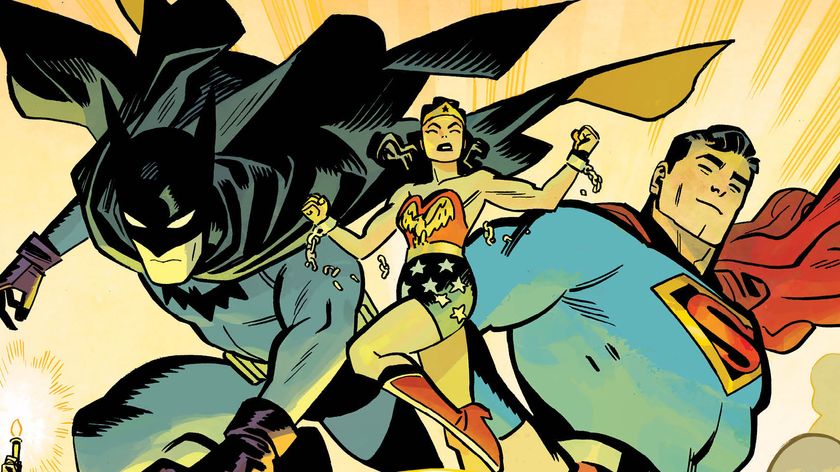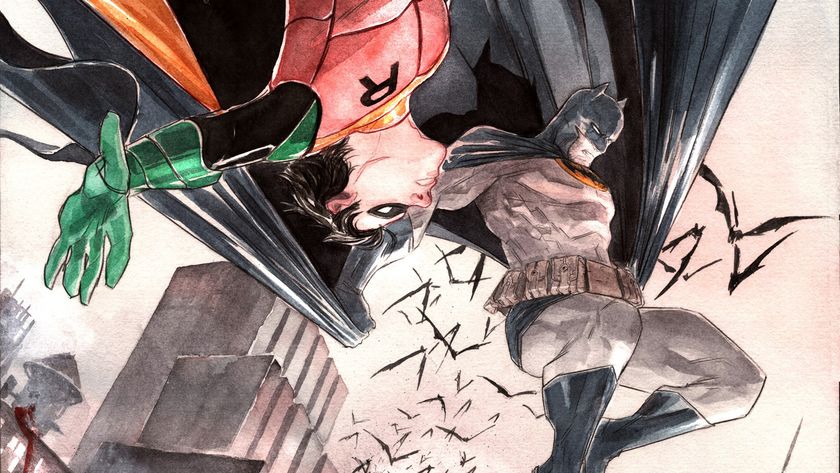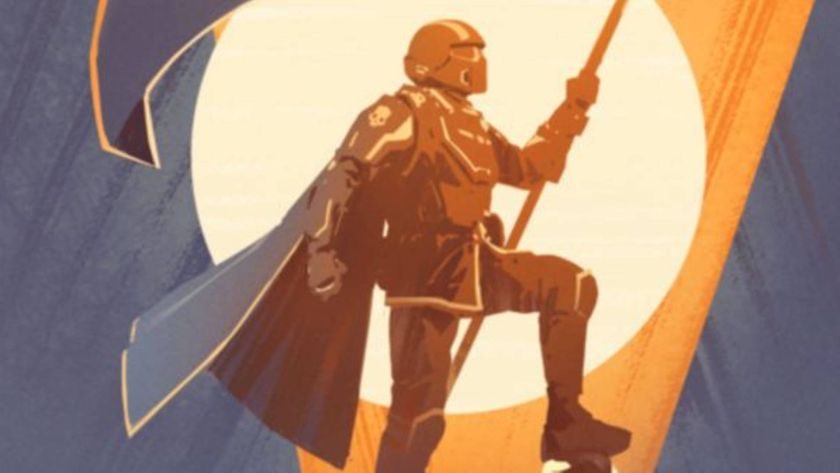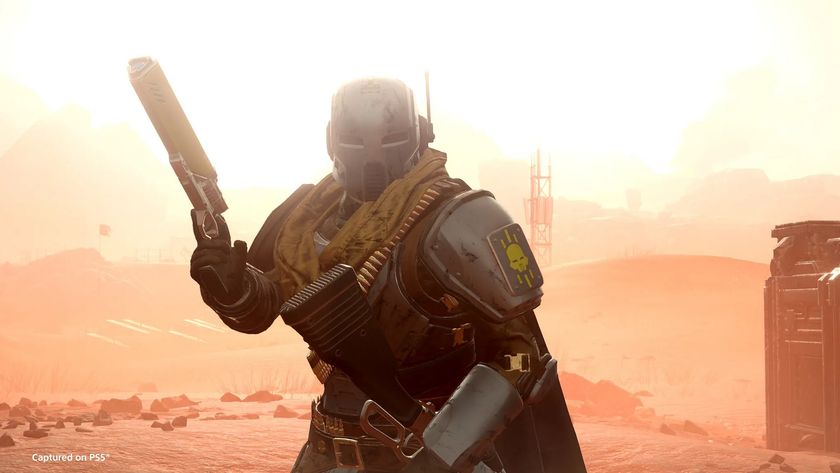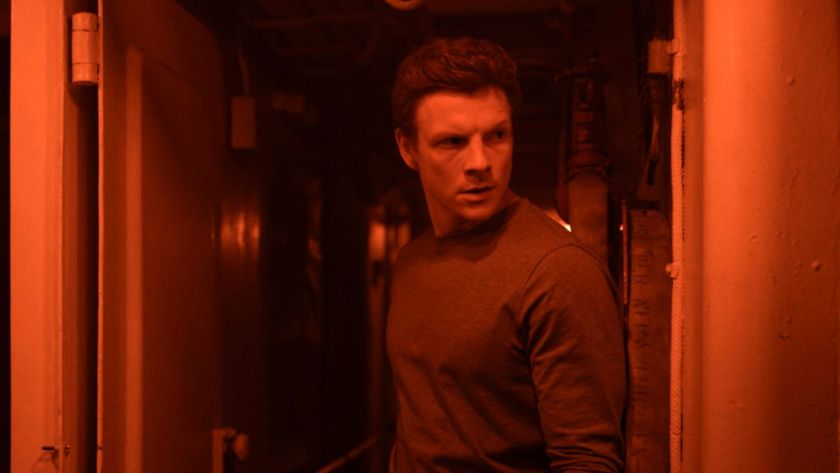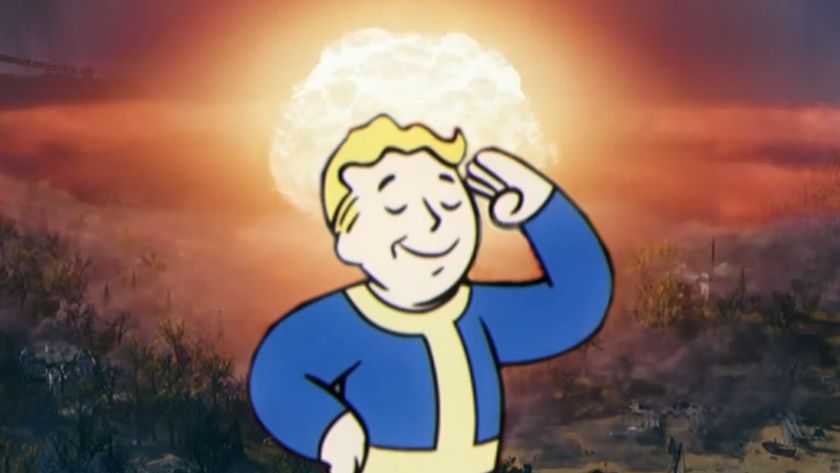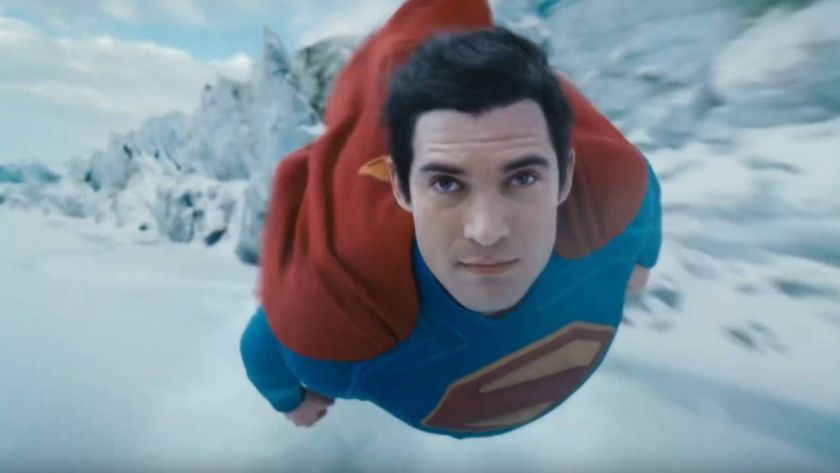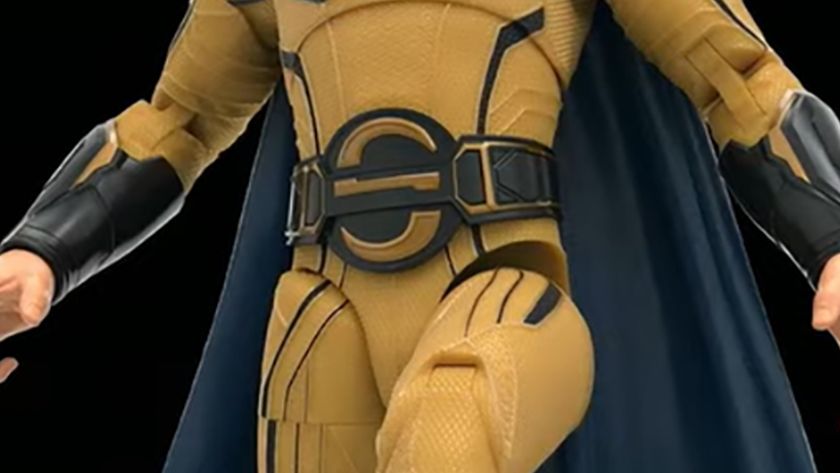"It's about grief and moving beyond grief" - the Flashpoint Beyond writers break down the series finale
Tim Sheridan, Jeremy Adams, and Geoff Johns talk the final issue of Flashpoint Beyond and its future DCU implications
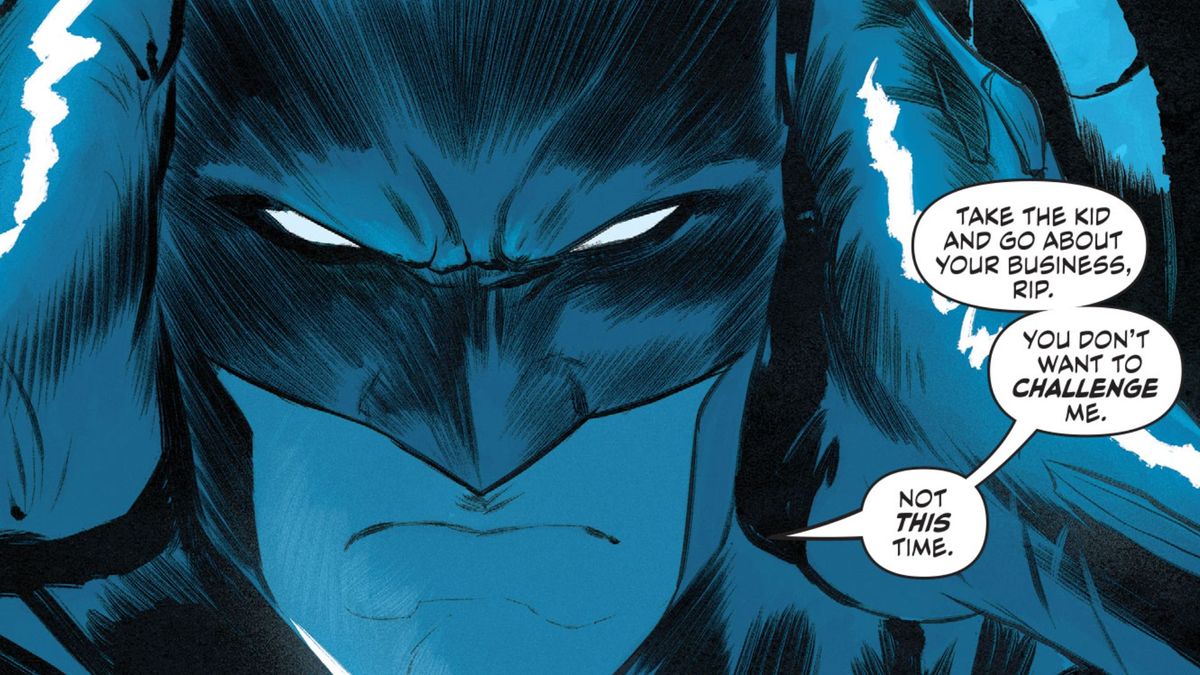
Flashpoint Beyond has reached its end. The Clockwork Killer has been revealed, and maybe even more importantly, so has Bruce Wayne’s plan. From the depths of the Batcave, Bruce has used Doomsday Clock artifacts to stabilize the Flashpoint Universe and save his father, Thomas. Unfortunately, this act threatens massive destruction in the main DC Universe.
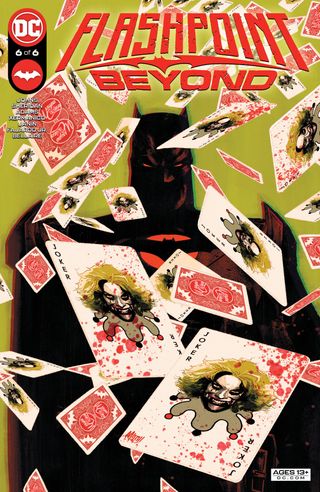
As explained by Rip Hunter, the leader of the Time Masters, the Flashpoint Universe is located in Hypertime, the ever-shifting river of realities that flows outside the Omniverse. By resurrecting Thomas within Flashpoint, Bruce is risking a kind of spillover, leaking that universe into our own and causing massive chaos.
But will Bruce stop his plan? Will Thomas, once he realizes what’s at stake?
Newsarama sat down to talk about the end of Flashpoint Beyond with its writers, Tim Sheridan, Jeremy Adams, and Geoff Johns. Check out what they have to say about Hypertime, the possibilities within the Flashpoint Universe, and the themes that have always driven it. Flashpoint Beyond #6, the series finale, goes on sale October 18.
But first…
Spoilers ahead for Flashpoint Beyond #6
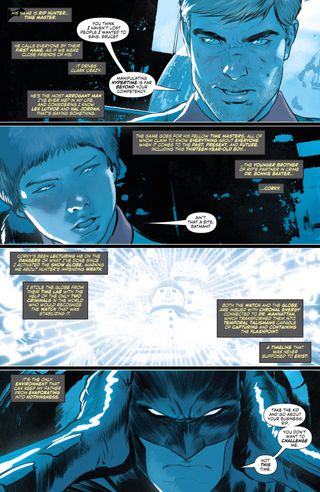
Grant DeArmitt for Newsarama: Alright Tim, Jeremy, Geoff. We know that the characters in the Flashpoint Universe are aware of those in the main continuity, and vice versa. But just how much do they know? For example, does Bruce Wayne know about the Clockwork Killer?
Tim Sheridan: That’s interesting. What do you think? I mean, I feel like…
Comic deals, prizes and latest news
Get the best comic news, insights, opinions, analysis and more!
Jeremy Adams: I bet we're all going to have different opinions.
Sheridan: Yeah, exactly.
Adams: I think Batman knows and I think Rip knows. What [Time Masters member] Corky knows, I’m not sure. I think he knows that what Bruce is doing is really crazy, whatever that might be.
Sheridan: They're focused on bigger things, though, too, I think.
Geoff Johns: Yeah, they know that the Flashpoint timeline involves a world where Bruce Wayne was killed and that Thomas Wayne is put back into that world. They know that much. Rip knows more because he can look at the timelines. He knows what's going on with Martha. He knows she's alive. He knows she's in there and he knows Bruce doesn't know that.
And he also knows what’s going to happen if Flashpoint continues to exist. He says it's like a body rejecting an organ. He thinks Thomas is going to reject this organ like it's not going to work and that's going to detonate this timeline, which is going to erupt and tumble into our world and cause all sorts of chaos.
Whereas Bruce thinks that, no matter what's going on in there, his father is eventually going to have to face it and accept it. Because he's read his letter.
[editor's note: Johns is talking about the letter that Thomas Wayne wrote Bruce at the end of Flashpoint, delivered to him by Barry Allen. Look it up, it’s a tearjerker.]
Johns: Rip thinks he knows more [about Thomas] than Bruce, but Bruce knows more. Well, factually, Rip does, but Bruce knows more emotionally. And that's what matters here.
Nrama: Because Hypertime is emotion.
Johns: Yeah. Hypertime is emotion, the Omniverse is fact.
Sheridan: Also, how many people have made the mistake of thinking they know more than Bruce in any given situation?
Johns: And what's more important to know? What's more important is to know is how someone's going to react emotionally and deal with it.
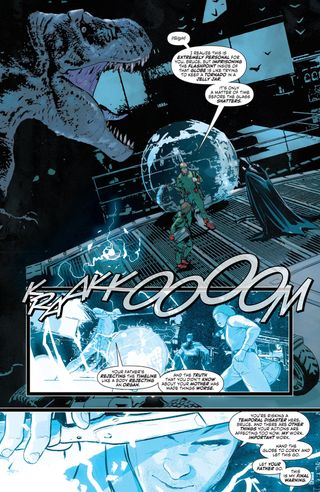
Nrama: So it’s like the distinction between having knowledge of someone and having faith in them? Because Bruce has faith in his father, right?
Johns: Yeah. Bruce knows his father emotionally. Rip just knows him factually. He probably projects a bunch of stuff on him and doesn't really understand him.
Sheridan: And that's an interesting thing that Flashpoint gives us too, which is that, if it was the Thomas Wayne who was killed on Park Row, would Bruce know that man as well as he knows the Thomas Wayne who is Batman?
I'm fascinated by the fact that the relationship between Bruce and the Flashpoint Thomas is incredibly close because of the connective tissue. You know, the trauma that they've both endured and the Bat-costume. It's great that they’ve found each other.
Johns: Yeah. Since the first Flashpoint, the whole idea was that losing a parent is much different than losing a child. The emotional state of being and grief is so vastly different for people, and I can speak to that firsthand. And so they had that shared grief, although it's very different. How that affects them, and how they deal with it, was always what Flashpoint was about.
Nrama: Speaking of the parent-child relationship, Jeremy, let’s talk about Dexter Dent. He’s broken his mom out of Arkham, but now she, or at least, the Two-Face side of her, is holding him hostage. What’s going through Dexter’s mind as we begin issue #6?
Adams: I don't think Dexter knows the extent of how crazy she is. It's really a weird, weird thing. You know, I have tough relationships with certain parental figures and, no matter how tough it is, you're just conflicted. It's hard because here's this person that's crazy, and you probably know they're crazy, but that's the only person you pin your hope on. And then you realize, oh, this isn't working out the way.
Sheridan: If Dexter Dent has a superpower, it's his ability to see right past all of the complicated, intricate stuff that Jeremy was just talking about and see things as they are. To know exactly what has to be done. Thomas was forged by the Flashpoint. Dexter was born into it. And I think that that has affected who he is.
I think that he knows once he knows that his mom is, for lack of a better way of putting it, just bad, he understands that there's a problem. That he's on one side and she's on the other. And I think that's why, to me, I think that if he has a superpower, it's the ability to make those distinctions and move on from them. As a kid, which is interesting.
Johns: Tim really got under Dexter in a way, in a big, big way. He’s a really interesting Robin because he's so driven, and he's hyper-violent because he grew up in the Flashpoint universe. He doesn't exist outside it, which makes him interesting too. There isn't a version of 'what's the Dexter Dent of our world?' It doesn't exist because Harvey Dent never had children here. There's something really cool about that makes him really unique as a Robin.
Sheridan: He couldn't exist in our world. Yeah.
Adams: But of every Robin, he's got, like, the most traumatic origin story ever.
Johns: Exactly.
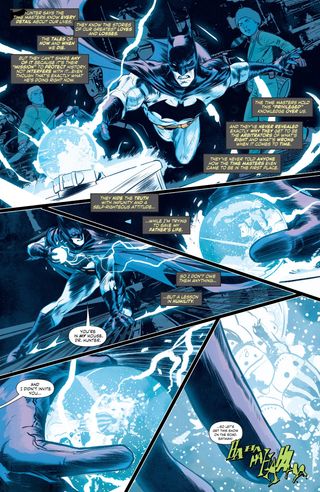
Sheridan: I think the fact that he just deals with it is what I mean about his superpower. I think the way he deals with it looks harsh, but he’s just dogmatic about it. He just knows what to do.
Johns: And he's got the coolest parents in the world! Batman and the Joker. I do want to see more of that trio. Tim, you were the one who always wanted to do the classic Batman and Robin running scene. And that last page, seeing those three together is so cool. Knowing those three will work together to save the world from Kryptonians is badass. To do it. I don't leave that going, ‘Wow, I hope they beat them.’ I leave that going, ‘Wow, they're going to kick their ass.’
Sheridan: I love that page. It's such classic Batman and Robin, but then you've got the Joker in a cell behind them. It almost feels like Charlie's Angels, you know? It's very strange, though.
Johns: We got stupid lucky with the emotions that art conveys. That’s Xermánico, you know? Mikel Janín too, it's just top-notch, that emotion that they deliver, the power, the energy, the colors are beautiful. The letterer Rob Leigh, of course, probably is the best letterer in the business.
Nrama: One of the questions that I wanted to ask was since Hypertime is born out of emotion, is every world born out of grief doomed? Both of the Flashpoints are born from the emotion of grief, but it seems like, with how you're talking about the end of Flashpoint Beyond, you don't think so.
Johns: I think Tim encapsulated that because, when I wrote the first Flashpoint, that was what it was about, but I wasn't as conscious of it as maybe I thought I was at the time. And Tim really helped sum up, emotionally, what Flashpoint was about. And [Flashpoint Beyond] is the same, it’s about grief and it’s about moving beyond grief.
It's not about erasing grief, it's about incorporating it and trying to find, I’d dare say, the silver lining, because that's all you can do. You know, if you're going to move forward and if you're going to keep living your life, all you can do after you get through the process is to incorporate it and try to make the best of what is left.
And I think that's what Flashpoint Beyond does. We do end on a very violent note, but it's a very hopeful note. And ultimately, that's the truth. The truth is that grief is not going to be cleanly erased, only incorporated. No one tells you that when you lose somebody. That you don't get over it, you just incorporate it.
Sheridan: What’s so interesting about the first Flashpoint is the tactic for Barry is to attack that grief. He says, ‘I have to act on it and remove it from my life.’ There was something we started thinking about in the process of writing this, which is about how you move beyond it. There’s the idea of making friends with it, which sounds horrific, but then we took it a step further. And I think what we see in that last page we're talking about is making it your family. I mean, that's what these characters are all doing in the end. Will it work?
Johns: Right. And you know, Rip says it to Bruce in issue #6, that the Flashpoint universe was created and comes from Barry Allen's grief. That's why it's so dark and twisted. And he's saying, like, ‘Can you imagine if this explodes now, Bruce? The world's not going to be recreated by Barry Allen’s grief, but by yours!’
I love that because you're like, ‘What would that look like?’ If Barry Allen's pain is infecting the world and changing it to reflect that for everybody, what would Bruce’s do? That would be a very horrific world to see.
Nrama: Wrapping up, how does the end of Flashpoint Beyond set up the New Golden Age?
Johns: We wanted to tell a complete story with Flashpoint Beyond, which has an emotional beginning, middle, and end. And we see characters like Thomas and Bruce have their stories told and Bruce's faith in his father be the linchpin to everything. But, ultimately, these stories, they're dominoes, right? You want this domino to stand alone, but also affect things coming up.
In a lot of these events, the characters come back. There are a lot of characters that come back. We wanted to really introduce new characters and not just new characters moving forward, but characters that existed in the Golden Age to flesh out the Golden Age. So the new Golden Age doesn't just mean ‘the new Golden Age moving ahead,’ it's talking about the new JSA book and what that legacy looks like and where those characters are going.
But it also goes back with these characters that were from the 1940s, that were pulled from history and are going back into it. So now, we can tell stories in the past that you won't know. The past isn't exactly what you've seen. You've not seen every tale.
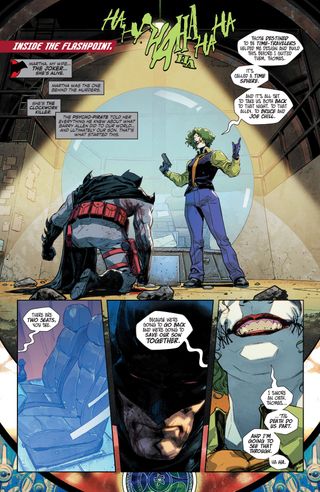
The idea was to not only do something new now, but do it new then, and to just let the history of the DC Universe in the past grow. And, of course, have the present grow and the future grow with new characters, new adventures, with characters that could tie to other characters that we already know and love and have their worlds and their families expand.
We'll see all those characters in the Golden Age, in Stargirl: Lost Children, and in other books to be announced that are coming up. Stay tuned.
Thomas Wayne's Batman versus Martha Wayne's Joker is a fascinating twist on one of comics' greatest rivalries. But did Knight of Vengeance make it into Newsarama's best Batman and Joker stories? You'll have to read it to find out.

Grant DeArmitt is a NYC-based writer and editor who regularly contributes bylines to Newsarama. Grant is a horror aficionado, writing about the genre for Nightmare on Film Street, and has written features, reviews, and interviews for the likes of PanelxPanel and Monkeys Fighting Robots. Grant says he probably isn't a werewolf… but you can never be too careful.
